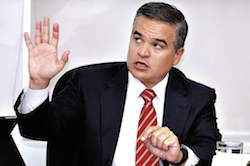Honduran businessman and politician, Yani Rosenthal, has allegedly turned himself over to authorities, following US indictments on money laundering charges against the Rosenthal family. The decision may be part of an attempt to safeguard the elite Honduran family’s economic and political interests.
According to a source from Honduras’ Attorney General, Yani Rosenthal has agreed to respond to an indictment for money laundering from a US Federal Court, reported La Prensa. The indictment against Yani, his father Jaime Rosenthal, his cousin Yankel Rosenthal, and Andres Acosta Garcia, a lawyer for the family’s business Grupo Continental, was released by US authorities after Yankel’s arrest in Florida on October 6.
Sources say that Rosenthal turned himself over on recommendations of his lawyers, seeking to avoid “imminent” extradition and to lessen any hardship for his father, Jaime Rosenthal, in the judicial processes, stated La Prensa. There has not yet been any confirmation of this action by US authorities or lawyers for the Rosenthal family.
Yani Rosenthal had previously spoken out against the charges, denying any wrongdoing on the part of the family or their businesses. In an interview with the newspaper El Heraldo, Yani, who is thought to be at the center of the family’s illegal business dealings, defended the Rosenthals and their businesses against accusations of money laundering and drug trafficking.
InSight Crime Analysis
While Yani Rosenthal’s surrender has not yet been confirmed, there are a few advantages to turning himself in at this stage in the process. For one, the move to offer himself over may provide some legal protection for his father. The 79-year-old Jaime Rosenthal, who ran Grupo Continental and led Honduras’s Liberal Party (PL), is said to be in precarious health. While Yani has denied any involvement with criminal organizations, Jaime previously confirmed the family’s business dealings with the Cachiros, one of Honduras’s biggest trafficking organizations. By turning himself over, Yani might be in a better position to control the family’s statements in the investigation.
SEE ALSO: Coverage of Elites and Organized Crime
Secondly, Yani’s decision may be so as to protect the Rosenthals’ conglomerate, Grupo Continental, one of Honduras’s largest economic groups. The US indictment was released at the same time as the US Treasury Department’s Office of Foreign Assets Control (OFAC) added three Rosenthals and seven of their businesses to the “Kingpin List,” effectively embargoing all business dealings with the family. While there are no open investigations against the Rosenthals in Honduras, Honduran officials have seized at least 16 of the family’s assets. The government has also closed the Rosenthal’s Banco Continental. Liquidation of the bank has been a major financial hit for the both the family and ordinary Honduran citizens.
Finally, Yani Rosenthal’s willing participation in the case may also be an attempt to defend his political career. Yani served as a minister under Honduran president Manuel Zelaya and unsuccessfully ran for president in the last election cycle. While the Liberal Party has voiced its support for the family in the wake of the accusations, the investigation may be a death knell for Yani’s political future.

